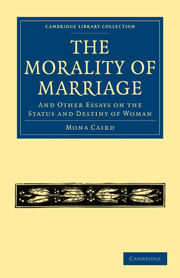PART I - SUPPRESSION OF VARIANT TYPES
Published online by Cambridge University Press: 16 May 2011
Summary
“It is with men as with trees—if you lop off their finest branches, … the wounds will be healed over into some rough boss, some rude excrescence, … the trivial erring life which we insult with our harsh blame, may be but as the unsteady motion of a man whose best limb is withered.”
—George Eliot.The teaching of History defies the popular notion that elemental human passions are entirely beyond the power of circumstance.
Like most popular notions, this one is false and superficial. No instinct, however strong, but has shown itself, in certain conditions, tame and subservient; no heroism, however great, is beyond the strength of average man or woman, when demanded as a duty by the creeds of the race. But to this we must add: no crime, however base, no cruelty, however fiendish, is shrunk from when religious enthusiasm dictates, or when social law commands.
It must be understood that man, in any age and country, is liable to revert to a state of savagery, if conditions favour such a retrogression. His surroundings gradually persuade him into harmony with themselves, not only by direct action upon his own nature, but by exterminating those of his contemporaries who are unable to endure them. The race, therefore, even more than the individual, is clay in the hands of the potter: Circumstance.
Extremes of good and evil may be found side by side, even in the same person, if one part of his nature has been cultivated, while the other has been left unaltered.
- Type
- Chapter
- Information
- The Morality of MarriageAnd Other Essays on the Status and Destiny of Woman, pp. 195 - 211Publisher: Cambridge University PressPrint publication year: 2010First published in: 1897



